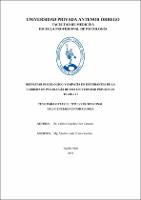Bienestar psicológico y empatía en estudiantes de la carrera de psicología de una universidad privada de Trujillo

View/Open
Download
(application/pdf: 24.48Kb)
(application/pdf: 24.48Kb)
Date
2019Author(s)
Céspedes Diez Canseco, Carlos
Metadata
Show full item recordAbstract
Se ha realizado una investigación sustantiva, cuyo objetivo general fue
determinar la relación entre bienestar psicológico y empatía en estudiantes de la
carrera de psicología de una universidad privada de Trujillo. Para ello se trabajó
con una muestra de 544 estudiantes del 1ero a 10mo ciclo de la carrera de
psicología de una universidad privada de Trujillo, con edades entre 17 y 30 años,
varones y mujeres, con matricula vigente en el periodo 2018-II., empleando para
su evaluación a la Escala de Bienestar Psicológico para Adultos (BIEPS-A) de
Casullo (2002) y el Test de Empatía Cognitiva y Afectiva (TECA) de López,
Fernández y Abad (2002). Los resultados muestran que predomina en los sujetos
de estudio, un nivel medio de Bienestar Psicológico, y sus dimensiones; y el nivel
medio de de Empatía, y sus dimensiones. Asimismo, se logró determinar que
existe una correlación muy significativa (p<.01), positiva y en grado medio, entre
las variables de estudio. A substantive investigation has been carried out, whose general objective was to
determine the relationship between psychological well -being and empathy in
students of the psychology career of a private university in Trujillo. For this, we
worked with a sample of 544 students from the 1st to 10th cycle of the psychology
career of a private university in Trujillo, aged between 17 and 30, men and
women, with enrollment in force in the 2018-II period., using for its evaluation the
Scale of Psychological Wellbeing for Adults (BIEPS-A) of Casullo (2002) and the
Cognitive and Affective Empathy Test (TECA) of López, Fernández and Abad
(2002). The results show that a medium level of Psychological Wellbeing
predominates in the study subjects, and its dimensions; and the average level of
Empathy, and its dimensions. Likewise, it was possible to determine that there is
a very significant correlation (p <.01), positive and in a medium degree, between
the study variables.
Collections
- Psicología [613]

